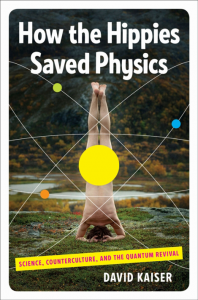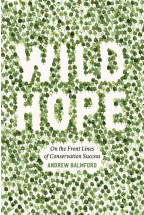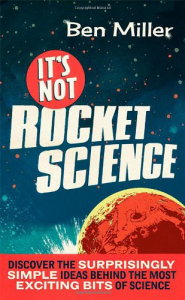FRIDAY, 25 JANUARY 2013
What do Bell’s non-locality theorem, hot-spring bathing, and the spirit of Harry Houdini have in common? According to science historian David Kaiser, they all played a part in a major shift in thinking amongst quantum physicists; one which leads right to our contemporary view of the subject. How the Hippies Saved Physics deals with a period in American science, beginning towards the end of the Cold War and lasting up until the present day. Kaiser charts the increasing influence of the ‘Fundamental Fysiks Group’ at Berkeley within a physics profession dominated by a non-philosophical ‘shut up and calculate’ mindset. Th rough ever-expanding social connections with prominent public groups, CIA figures enquiring about the military potential of telepathy, plus the rising sales figures of textbooks such as The Tao of Physics, their major questions began to pervade the consciousness of the public and mainstream physicists alike. While on one level this is a piece of exemplary historical research, it also off ers insights into key questions pervading studies of science: the border between acceptable and pseudo-science; the impact of unconventional thinking; the role of non-scientists’ networks of communication. For anyone looking for a highly intriguing and very entertaining depiction of the growth of an abstract science within real-world settings, Kaiser has provided an exemplary study. Oliver MarshWild Hope – Andrew Balmford
One of the major successes of the conservation movement has been to create mass awareness of the biodiversity crisis we have created through our actions. In Wild Hope, Andrew Balmford argues that while the creation of awareness has undoubtedly been important, there is a risk of convincing people that the situation is so severe any actions to improve it will be futile. He addresses this balance by highlighting examples of conservation success stories, with the aims of both inspiring hope and analysing why some conservation projects succeed where so many others fail. By considering a range of examples—from community-led conservation of cloud forests in Ecuador (which saves both rare species and water supplies) to protecting India’s rhinos with armed guards, or reforming environmental protection laws to persuade previously hostile American landowners to promote threatened woodpeckers on their properties—Balmford shows that solutions will need to be carefully tailored to each location and problem. Th ere are some important constants, such as leadership, tenacity, bold thinking and good research that are present in the successful conservation movement. Th is book is everything one could want from a popular conservation book: well written, informative, passionate, and inspiring. Graham Prescott
It’s Not Rocket Science – Ben Miller
What is the Higgs particle? What is the science behind baking? And is there intelligent life elsewhere in our galaxy? These are just some of the questions Ben Miller tackles in his book It’s Not Rocket Science. This book is brimming with detail and will enlighten even the most able minded. Perhaps best known as one half of the comedy duo ‘Armstrong & Miller’, Ben Miller covers topics ranging from the workings of the Large Hadron Collider (“a circular underground racetrack for protons”), cosmology, evolution and genetics, food science and climate change. Although the ideas and theories behind the science are complex, Miller manages to make them seem simple and accessible, using hand drawn diagrams, references to popular culture, and humour (as one might expect!). He also discusses the phenomena we still don’t know or understand and conveys how important and exciting scientific research is. Th e chapter on climate change is a highlight. He presents all the evidence for and against man-made climate change in a balanced manner, as opposed to polarised arguments often heard in the media. In addition, the author’s anecdotes make for a particularly entertaining reading. His passion and enthusiasm for science is obvious from the outset and makes reading this book a pleasure. Laura Pearce



